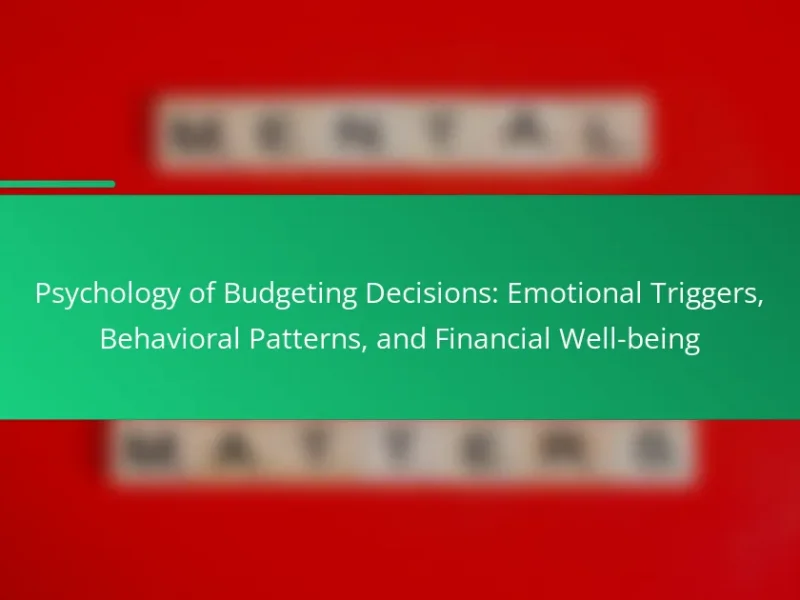A positive money mindset significantly reduces stress and anxiety related to finances. This article explores how financial anxiety arises from economic instability and poor financial literacy, the characteristics of financial empowerment, and effective strategies for managing money-related stress. By fostering a constructive relationship with money, individuals can enhance their emotional well-being and achieve greater financial security.

How does money mindset influence emotional health?
A positive money mindset enhances emotional health by reducing stress and anxiety related to finances. Individuals with a growth-oriented perspective view financial challenges as opportunities, fostering resilience. Research indicates that financial empowerment correlates with improved mental well-being, as it encourages proactive financial behaviours. By cultivating a healthy relationship with money, individuals can experience greater peace of mind and emotional stability.
What are the psychological effects of financial stress?
Financial stress leads to anxiety, depression, and impaired decision-making. It can cause physical symptoms like headaches and fatigue. Chronic financial strain negatively affects relationships and overall well-being. Strategies for managing financial stress include budgeting, seeking support, and practising mindfulness.
How can a positive money mindset improve well-being?
A positive money mindset enhances well-being by reducing stress and anxiety related to finances. This mindset fosters financial empowerment, encouraging proactive money management. Individuals with a positive outlook on money often experience improved emotional health, as they feel more in control of their financial situations. As a result, they can make informed decisions, leading to greater overall life satisfaction.
What strategies foster a healthier relationship with money?
To foster a healthier relationship with money, focus on understanding your emotions related to finances. Cultivating self-awareness helps identify triggers of stress and anxiety. Establishing clear financial goals promotes empowerment and control. Practising gratitude for what you have encourages a positive mindset. Regularly reviewing and adjusting your budget can alleviate financial pressure, leading to a more balanced perspective on money management.

What universal factors contribute to financial anxiety?
Financial anxiety stems from various universal factors, including economic instability, personal financial management skills, and societal pressures. Economic uncertainty can heighten stress as individuals worry about job security and market fluctuations. Poor financial literacy often leads to feelings of helplessness, exacerbating anxiety. Societal expectations, such as lifestyle comparisons, further contribute to financial stress. Awareness of these factors can empower individuals to develop healthier money mindsets.
How do societal expectations shape our financial decisions?
Societal expectations significantly influence our financial decisions by shaping perceptions of success and worth. These expectations often create pressure to conform to specific lifestyles, leading to stress and anxiety regarding financial choices. Individuals may prioritise spending on status symbols over essential needs, reflecting a unique attribute of money mindset influenced by societal norms. As a result, financial empowerment becomes challenging when decisions are driven by external validation rather than personal values. Understanding and addressing these societal pressures can lead to healthier financial habits and improved emotional health.
What role does financial literacy play in reducing stress?
Financial literacy significantly reduces stress by empowering individuals to manage their finances effectively. Understanding financial concepts enables better budgeting, saving, and investment decisions, which leads to increased confidence and reduced anxiety. Studies show that individuals with higher financial literacy report lower levels of financial stress, demonstrating a clear link between knowledge and emotional well-being. Financial education programmes can enhance literacy, equipping people with tools to navigate economic challenges and improve overall mental health.

What unique characteristics define financial empowerment?
Financial empowerment is defined by unique characteristics such as financial literacy, self-efficacy, and emotional resilience. These attributes enable individuals to make informed financial decisions, manage stress, and develop a positive money mindset. Financial literacy involves understanding financial concepts and tools, while self-efficacy reflects one’s belief in their ability to achieve financial goals. Emotional resilience helps individuals cope with financial stress and anxiety, fostering a healthier relationship with money. Together, these characteristics create a foundation for sustainable financial well-being.
How can setting financial goals enhance mental clarity?
Setting financial goals enhances mental clarity by providing direction and reducing stress. Clear objectives help individuals prioritise their spending and saving, leading to improved decision-making. This structured approach can alleviate anxiety related to financial uncertainty. Studies show that goal-setting significantly boosts financial confidence and overall emotional well-being.
What practices promote resilience against financial setbacks?
Practices that promote resilience against financial setbacks include cultivating a positive money mindset, developing emotional awareness, and enhancing problem-solving skills. These strategies empower individuals to navigate stress and anxiety effectively.
Engaging in regular financial education strengthens knowledge and confidence, which are unique attributes of a resilient mindset. Building a support network offers emotional backing during challenging times, fostering a sense of community and shared experiences.
Mindfulness practices, such as meditation, can help manage stress, allowing individuals to maintain clarity in financial decision-making. Regularly reviewing financial goals and adjusting them as needed encourages adaptability, a rare but valuable attribute in resilience.
Establishing a budget and tracking expenses enhances financial literacy, helping individuals to anticipate and mitigate potential setbacks. This proactive approach reinforces a sense of control over finances, further promoting emotional health and empowerment.
How can mindfulness techniques support financial decision-making?
Mindfulness techniques enhance financial decision-making by reducing stress and anxiety, leading to clearer thinking. Practising mindfulness fosters emotional health, allowing individuals to approach financial choices with a calm mindset. This clarity can improve judgment, enabling better risk assessment and investment strategies. Studies show that mindfulness practices can boost financial empowerment by enhancing self-discipline and focus.

What rare insights exist about money decisions and mental health?
Rare insights reveal that money decisions profoundly impact mental health, influencing stress and anxiety levels. Studies show individuals with a positive money mindset experience lower anxiety and greater financial empowerment. Unique attributes, such as financial literacy and emotional resilience, correlate with healthier financial behaviours. Additionally, a lack of financial resources can lead to chronic stress, highlighting the need for effective financial education. As a result, fostering a constructive money mindset is essential for emotional well-being.
How do cultural beliefs impact financial behaviors?
Cultural beliefs significantly shape financial behaviours by influencing attitudes toward money management, spending, and saving. For instance, collectivist cultures often prioritise communal financial support, while individualistic cultures emphasise personal financial responsibility. These differing perspectives can lead to varied approaches to budgeting and investment strategies. Additionally, cultural narratives around wealth and success can create emotional stress or empowerment, affecting overall financial health. Understanding these cultural dimensions enables individuals to navigate financial decisions more effectively.
What uncommon financial habits lead to greater emotional stability?
Uncommon financial habits that lead to greater emotional stability include prioritising savings, practising gratitude, and embracing minimalism. These habits foster a positive money mindset, reducing anxiety and enhancing overall emotional health.
Prioritising savings helps create a safety net, which alleviates financial stress. Practising gratitude shifts focus from scarcity to abundance, improving emotional resilience. Embracing minimalism reduces the burden of financial obligations, promoting clarity and peace of mind.
Engaging in these habits can transform one’s relationship with money, leading to a more empowered and stable emotional state.

What are the best practices for managing money-related stress?
To manage money-related stress effectively, adopt proactive strategies. Start by creating a realistic budget to track income and expenses. Prioritise building an emergency fund to provide financial security. Practise mindfulness techniques, such as meditation or deep breathing, to reduce anxiety. Seek support from financial advisors or support groups to gain insights and share experiences. Lastly, cultivate a positive money mindset by focusing on financial goals and celebrating small achievements.
How can individuals cultivate a proactive financial mindset?
To cultivate a proactive financial mindset, individuals should focus on developing positive habits and attitudes towards money. This includes setting clear financial goals, practising mindfulness regarding spending, and embracing a growth mindset.
Engaging in regular reflection on financial decisions can enhance awareness and reduce anxiety. Utilizing budgeting tools can promote accountability and help track progress towards goals.
Building a support network, such as financial advisors or peer groups, can provide motivation and accountability. Continuous education on financial literacy further empowers individuals to make informed choices.
By integrating these practices, individuals can foster resilience against financial stress and anxiety, ultimately leading to improved emotional health and financial well-being.
What common mistakes should be avoided in financial planning?
Failing to set clear financial goals, ignoring budgeting, underestimating expenses, and neglecting emotional well-being are common mistakes in financial planning. These errors can lead to stress and anxiety, undermining financial empowerment. Establishing a realistic budget and prioritising mental health are crucial for effective financial management.
What are effective methods for tracking emotional responses to spending?
To effectively track emotional responses to spending, utilise journaling, digital tracking tools, and emotional check-ins. Journaling allows for reflection on spending triggers and feelings. Digital tools can categorise expenses and link them to emotions. Regular emotional check-ins help identify patterns between spending and mood, enhancing financial empowerment.
How can community support enhance financial well-being?
Community support can significantly enhance financial well-being by fostering a sense of belonging and shared resources. Engaging with others provides emotional encouragement, reduces stress, and promotes financial literacy. For instance, peer-led workshops can improve budgeting skills, while support groups create accountability. Research shows that emotional health directly influences financial decisions, leading to better outcomes. By leveraging community networks, individuals can access vital information and resources, enhancing their overall financial empowerment.


